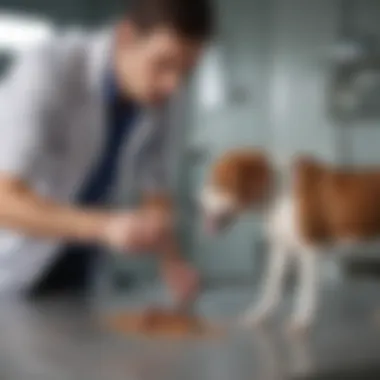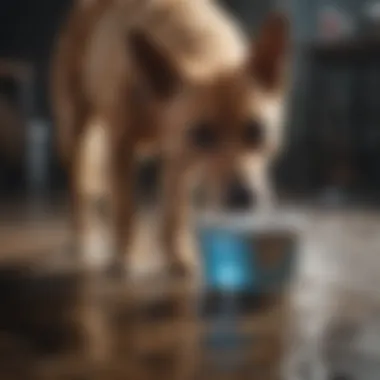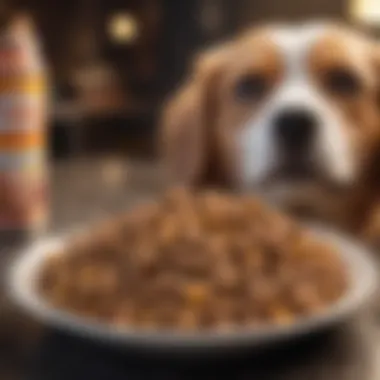Essential Guide to Feeding Dogs with Diarrhea


Intro
Dealing with a dog's diarrhea is challenging for any pet owner. It can be distressing to see your animal unwell. Understanding what to feed a dog experiencing diarrhea is crucial for their recovery. The right diet can help soothe their digestive system. In this guide, we will explore effective dietary strategies and safe feeding options, alongside when to consult a veterinarian.
Understanding Your Pet
Breed Traits
Every breed has unique traits that can influence their health and dietary needs. For instance, small breeds like Chihuahuas may have more sensitive stomachs compared to larger breeds like Labrador Retrievers. Knowing these traits can help when selecting what to feed your dog during instances of digestive upset. Breed-specific dietary recommendations can optimize recovery.
Common Temperaments
The temperament of a dog also matters. A nervous or anxious dog may refuse to eat, while a more relaxed dog might not be as picky. Observing your dog's behavior during this time helps in assessing their needs. If your dog is not eating, it is essential to explore why and adjust your approach accordingly.
Special Needs
Some dogs may have special dietary needs due to pre-existing health issues. For instance, dogs with food allergies or intolerances require careful selection of food. Pay attention to ingredients that could exacerbate their condition. Consult your veterinarian if you are unsure about the best options for your dog’s unique needs.
Nutrition and Feeding Guidelines
When a dog experiences diarrhea, their nutritional needs change. Consider the following points:
- Hydration: Ensure fresh water is always available. Dehydration is a common risk during diarrhea.
- Bland diet: A commonly recommended diet consists of boiled chicken or turkey with plain white rice. This combination is gentle on the stomach.
- Probiotics: Adding probiotics can aid digestion. However, consult your vet before administering any supplements.
It's important to introduce food gradually. Start with small portions and observe how your dog reacts. Should symptoms persist for more than a day or worsen, seeking veterinary care is advised.
Health and Wellness
Maintaining overall health is vital for recovery from diarrhea. Regular vet check-ups can help identify underlying health issues. Balanced nutrition is crucial in preventing digestive problems. Regular exercise also contributes to wellness, and should be incorporated once your dog shows signs of improvement.
When to Seek Veterinary Intervention
"If your dog's diarrhea lasts more than 24 hours, or if you notice blood in their stool, it is vital to contact a veterinarian immediately."
Being aware of when to seek help can save your dog from further complications. Other symptoms that warrant a vet visit include lethargy, vomiting, or signs of dehydration, such as dry gums or excessive panting. It’s always better to err on the side of caution.
End
Feeding a dog with diarrhea requires a strategic approach. Understanding breed traits, common temperaments, and special needs can greatly assist in managing their recovery. Coupled with the right nutrition and timely veterinary consultation, you can effectively navigate this difficult period. By being proactive and attentive, you ensure your furry friend returns to their usual health.
Understanding Diarrhea in Dogs
Understanding the nature and implications of diarrhea in dogs is crucial for pet owners. This condition can arise from various causes, and recognizing the type of diarrhea is important. It can serve as a sign for underlying health issues. Pet owners need to be informed about symptoms, possible complications, and initial responses. Understanding these elements contributes significantly to an effective management strategy during episodes of diarrhea.
Common Causes of Diarrhea
Canines experience diarrhea for numerous reasons, often linked to their dietary habits or environmental factors. Here are some common causes that can trigger this condition:
- Dietary indiscretion: Dogs are known for their voracious appetites. They might eat inappropriate items, like spoiled food or foreign objects.
- Food allergies or intolerances: Specific ingredients might not sit well with some dogs, leading to gastrointestinal upset.
- Infectious agents: Bacterial, viral, or parasitic infections can provoke diarrhea. Common culprits include parasites like Giardia or bacteria such as Salmonella.
- Medications: Certain medications can upset the digestive system, resulting in diarrhea.
- Underlying health conditions: Issues such as pancreatitis, liver disease, or inflammatory bowel disease may also present as diarrhea.
Understanding these causes aids in the identification and management of diarrhea effectively.
When to Observe Symptoms


Observing symptoms in a dog with diarrhea is essential. Not every case is critical, but some signs indicate that immediate attention is necessary. Key symptoms to track include:
- Frequency of bowel movements: An increase suggests a more significant issue.
- Presence of blood or mucus: This indicates inflammation or possible infections.
- Behavioral changes: If a dog shows lethargy, loss of appetite, or discomfort, this calls for further scrutiny.
- Vomiting: This can elevate concern as it often accompanies severe gastrointestinal distress.
Monitoring these symptoms helps in deciding when to seek veterinary guidance.
Potential Complications of Diarrhea
Left unchecked, diarrhea can lead to serious complications. A few potential risks include:
- Dehydration: This is the most immediate concern, especially if diarrhea persists. Dogs can become severely dehydrated, which can affect organ function.
- Electrolyte imbalance: Loss of fluids leads to an imbalance, impacting bodily functions.
- Weight loss: Prolonged diarrhea can contribute to weight loss, which can affect the dog's overall health.
- Sepsis: In extreme cases, bacteria can enter the bloodstream, leading to life-threatening infections.
Being aware of these complications emphasizes the need for prompt attention to a dog's health and well-being when diarrhea occurs.
Immediate Care for a Dog with Diarrhea
Immediate care is a critical first step for any dog suffering from diarrhea. Quick and appropriate actions can significantly affect the health and recovery of the dog. While diarrhea can be caused by many factors, the immediate focus should be on the dog's well-being and comfort. Failure to address the issue promptly can lead to dehydration or worsen the underlying condition. Pet owners must be mindful of their dog’s symptoms and provide necessary support during this distressing time.
Initial Assessment
When a dog exhibits diarrhea, performing an initial assessment is essential. Begin by examining the nature of the diarrhea. Is it watery or mucousy? Are there any signs of blood? Take a moment to observe the dog’s behavior—are they lethargic or in distress? Monitoring the frequency of diarrhea is also crucial. If your dog seems otherwise healthy and active, it may not be an emergency. However, if your dog shows other alarming symptoms, it may be a sign of more severe underlying issues.
Being thorough during this assessment helps determine if the situation requires further veterinary care. Keep a record of all observations, as this information may be valuable for your vet if a visit becomes necessary.
Hydration Management
Hydration management is one of the most critical aspects when dealing with diarrhea in dogs. Diarrhea can lead to rapid fluid loss, which puts the dog at risk of dehydration. Always ensure fresh water is available. Observe if your dog is drinking enough. If your dog doesn't seem inclined to drink, try to encourage hydration with an electrolyte solution designed for pets.
Additionally, you can offer small, frequent amounts of water rather than allowing the dog to consume a large quantity at once. Dehydration can be serious, so if you notice signs such as dry gums, excessive panting, or reduced skin elasticity, consult a veterinarian promptly.
Food withholding Duration
Determining the food withholding duration is equally important as assessing hydration. In general, withholding food for 12 to 24 hours is advisable to give the digestive system some time to recover. However, this can vary based on the dog's age, overall health, and specific circumstances around the diarrhea.
During this period, ensure your dog has constant access to water. Once the withholding period ends, start reintroducing food slowly, beginning with bland items, ensuring that it is easy on their stomach. This gradual process helps to avoid further irritation to the digestive tract and supports a smoother recovery.
Always remember that each dog is different, and nuances in their health status can dictate varied approaches in their care. If uncertain, consult a veterinarian for tailored advice depending on your dog's specific needs.
Recommended Foods for Dogs with Diarrhea
When a dog is suffering from diarrhea, choosing the right foods is crucial. The goal is to minimize digestive upset while providing necessary nutrients. A well-selected diet can promote recovery and restore gut health. Feeding inappropriate foods can prolong discomfort and worsen symptoms. Hence, understanding what to feed a dog with diarrhea is a vital aspect of managing this condition.
Bland Diet Basics
A bland diet serves as the foundation of feeding strategies for dogs experiencing diarrhea. This type of diet is designed to be gentle on the digestive system. Often, it includes easily digestible foods that provide adequate nutrition without overstimulating the gut. The primary benefit of a bland diet lies in its simplicity. It limits the risk of further irritation to an already sensitive stomach. In general, the bland diet is low in fat and fiber, making it easier for the body to absorb nutrients.
Suitable Protein Sources
Boiled chicken
Boiled chicken is a highly recommended protein source. It is easy to digest, making it suitable for a dog recovering from diarrhea. The lean meat provides essential protein that can help in healing. Moreover, it does not contain any spices or added fats, which can upset a delicate stomach. The main characteristic of boiled chicken is its straightforward preparation and palatability. Many dogs find it appealing, which encourages them to eat when they may not feel like it. However, it is important to avoid skin and bones when serving.
Plain white rice


Plain white rice is commonly suggested for dogs with diarrhea due to its high digestibility. It is low in fiber, allowing the dog’s digestive system to recover without the stress of processing heavy foods. This type of rice absorbs excess fluid in the digestive tract and helps firm up stools. A significant feature is its bland flavor, which makes it appealing to dogs with decreased appetite. While it is beneficial, it should be combined with protein, like boiled chicken, for a balanced approach.
Pumpkin
Pumpkin is another fantastic option for dogs with diarrhea. It is high in soluble fiber, which can help to bulk up stool consistency. Besides that, pumpkin is rich in nutrients such as beta-carotene, aiding overall health. The unique aspect of pumpkin is its versatility; it can be served canned or freshly cooked. However, pet owners must ensure they use plain pumpkin without added sugars or spices.
Easily Digestible Carbohydrates
Mashed potato
Mashed potato can be a beneficial addition to a dog’s diet during diarrhea. The key characteristic is its texture, offering a soft, easy-to-digest food. When prepared plain, mashed potatoes are gentle on the stomach while providing carbohydrates for energy. However, owners must be mindful not to add butter or seasoning, which can irritate the stomach further. The unique feature is how easily it can be prepared, providing a quick option when dogs refuse to eat.
White rice
As mentioned earlier, white rice holds a significant place in the diet for dogs with diarrhea. Its role as a carbohydrate source should not be underestimated. It serves as a binding agent, absorbing excess liquids in the gut. Unlike other grains, white rice is easily digestible, making it a favored choice among pet owners. The simplicity of preparation is also an advantage, as it cooks quickly and combines effortlessly with other foods.
Sweet potato
Sweet potato is an excellent alternative carbohydrate source. It offers a different flavor and nutritional profile compared to white rice. Rich in dietary fiber, sweet potatoes support digestive health and can help stabilize stools. The unique aspect of sweet potato is its natural sweetness, making it appealing for many dogs. However, it is necessary to ensure that it is well-cooked and mashed for easier digestion.
Feeding the right foods during diarrhea is critical in promoting recovery. Proper choices can minimize discomfort and expedite healing.
Feeding Guidelines During Recovery
When a dog experiences diarrhea, proper feeding guidelines during recovery are crucial for restoring digestive health. A clear and systematic approach to reintroducing food can significantly influence the speed of recovery. This section outlines key elements for feeding dogs after a bout of diarrhea. It considers the benefits of a careful feeding process, explains the significance of gradual reintroduction, frequency of meals, and how to closely observe for signs of improvement.
Reintroducing Food Gradually
After a period of fasting or limited feeding, it is essential to reintroduce food gradually. Start with small amounts of bland food. A common initial choice is a mixture of plain boiled chicken and white rice. This combination offers a gentle start that is easy on the stomach.
Gradually increasing the amount and variety of food is important. The general recommendation is to wait at least 12 to 24 hours before beginning to offer a small portion. Incrementally increase food intake while observing the dog's tolerance and reaction. Following this method can help to avoid overwhelming the digestive system too soon.
Frequency of Feeding
While recovering from diarrhea, adjusting the frequency of feeding can aid digestion and absorption. Frequent, smaller meals are usually more effective than larger meals. This helps the dog's system to gradually acclimate back to its normal diet without causing strain.
Typically, it is advisable to feed the dog three to four small meals a day during recovery. This approach provides energy and nutrients while enhancing the overall digestibility of the food. As recovery progresses and the dog shows signs of improvement, normal feeding frequency can be resumed.
Monitoring for Improvement
Close observation is vital during the recovery phase. Regularly monitoring the dog's stool consistency is an important measure of progress. Healthier stools indicate that the dog is responding well to the reintroduction of food. Conversely, if diarrhea persists or worsens, it is crucial to reconsider the dietary choices.
Look for any signs of discomfort, lethargy, or further gastrointestinal issues. If the dog does not improve within two to three days of reintroduction, or if there are troubling symptoms, it is advisable to consult with a veterinarian.
Good recovery practices cannot be overstated, as they lay the foundation for overall health and well-being.
By adhering to these feeding guidelines, pet owners can assist their dogs in a smoother recovery process from diarrhea.
Foods to Avoid During Diarrhea
Dogs suffering from diarrhea need careful dietary consideration. Not all foods aid recovery; some can worsen symptoms. Identifying and avoiding these foods is crucial in promoting faster healing and preventing further digestive upset.
Common Food Triggers


Certain ingredients are recognized as significant contributors to diarrhea in dogs. These include:
- Dairy products: Many dogs lack the enzyme lactase, making it difficult to digest dairy. This can lead to gastrointestinal distress.
- Fatty foods: High-fat items can be hard on a dog’s stomach, potentially leading to vomiting or worsening diarrhea.
- Spicy foods: Ingredients with strong spices can irritate a dog's gut, which can exacerbate diarrhea.
- High-fiber foods: While fiber is normally good for digestive health, excessive amounts can have the opposite effect during an episode of diarrhea.
Understanding what to avoid helps in making informed decisions about your dog's diet during illness.
Human Foods and Snacks
While some human foods can be beneficial for dogs, many are unsuitable when they have diarrhea. Foods often found in kitchens can be harmful:
- Chocolate: This is toxic to dogs in any form, causing severe gastrointestinal upset.
- Grapes and raisins: Even a small amount can lead to kidney damage and diarrhea.
- Onions and garlic: These can be harmful, affecting red blood cell function and leading to gastrointestinal irritation.
- Processed snacks: These often contain additives and preservatives that can disturb a dog's digestive system.
It is essential to maintain a strict diet devoid of these items until your dog's digestive health returns. Always consult a veterinarian if you are uncertain about specific foods. Remember, the wrong food during this time can complicate recovery further, leading to more serious health issues.
Veterinary Considerations
Veterinary considerations play a crucial role in navigating the complexities of managing a dog's diarrhea. An understanding of when to engage a veterinarian is fundamental. Early interventions can prevent situations from escalating. Some dogs may have underlying health issues that are not immediately evident. Therefore, recognizing the signs that go beyond typical digestive upset is vital for the pet's well-being.
When to Consult a Veterinarian
Pet owners should seek veterinary advice in several scenarios, including but not limited to the following:
- Persistent diarrhea lasting more than 24 hours.
- Presence of blood in the stool.
- Vomiting accompanies diarrhea.
- Signs of dehydration evident through lethargy, dry gums, or excessive thirst.
- If the dog is very young, very old, or has pre-existing health conditions.
Consulting a vet is not just a precaution; it can lead to a quicker resolution of the problem and avoid complications.
Potential Diagnostic Tests
Diagnosis may require specific tests to pinpoint the issue behind the diarrhea. These tests might include:
- Fecal exams to identify parasites or bacterial infections.
- Blood tests to check for systemic issues.
- Ultrasound or X-rays may be necessary to observe any internal abnormalities.
While these tests may sound overwhelming, they facilitate a targeted approach to treatment. Understanding the cause of diarrhea allows for more effective management moving forward.
Possible Medications or Supplements
Depending on the identified cause, the veterinarian may prescribe various medications or supplements. This could include:
- Antibiotics for bacterial infections.
- Antiparasitic treatments if parasites are involved.
- Probiotics to restore gut flora.
- Anti-nausea medications to alleviate discomfort.
Using these therapies responsibly can greatly contribute to the recovery of the dog. However, any medication should only be administered under veterinary guidance to prevent potential side effects or complications.
Effective management begins with understanding when professional assistance is needed. Recognizing these veterinary considerations helps ensure the health and comfort of your dog during episodes of diarrhea.
Long-Term Dietary Adjustments
Long-term dietary adjustments are critical for dogs that have experienced diarrhea. These changes not only address immediate digestive issues but also help in maintaining overall health and prevent future occurrences. Understanding your dog's specific dietary needs can enhance their quality of life significantly.
Identifying Food Allergies
Identifying food allergies is an essential first step in making long-term dietary adjustments. Many dogs develop sensitivities to certain ingredients over time. Common allergens include beef, dairy, wheat, and chicken. To pinpoint the trigger:
- Monitor symptoms: Keep a diary of your dog’s reactions to different foods.
- Conduct elimination diets: Gradually remove potential allergens from your dog's diet and observe any changes.
- Consult with a veterinarian: A professional can provide guidance and possibly recommend allergy testing.
Identifying allergies allows for tailored nutrition designed to avoid specific triggers, reducing the risk of future digestive upset.
Importance of a Balanced Diet
A balanced diet is fundamental for a dog's recovery and long-term health. Dogs need a mix of proteins, fats, carbohydrates, vitamins, and minerals to thrive. Feeding them a balanced diet helps:
- Strengthen the immune system: Proper nutrition improves the body's ability to fight off infections and diseases.
- Maintain healthy digestion: A diverse diet supports gut health and function, which is crucial after experiencing diarrhea.
- Sustain energy levels: Adequate nutrition ensures dogs have the energy needed for daily activities and play.



